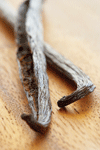
The tradition of vanilla as an ingredient in beverages was built, bean by bean, in colas, cream sodas and root beer. But the emergence of health-conscious consumers and the industry’s development of new products to meet swelling demand have helped the ingredient hold its spot among the most popular flavors.
Vanilla was among the best-selling flavors in 2009, according to Beverage Industry’s 2010 Product Development Survey. About 41 percent of respondents use vanilla as a flavor, according to the survey. It also revealed that beverage-makers expect vanilla to be among their top sellers in 2010.
Vanilla expansion
The bean-based ingredient has gained popularity as a masking agent in bitter drinks like coffee and tea, and now it is becoming increasingly popular in soy beverages, fortified drinks and spirits, producers of the ingredient say.
For example, Svedka added to its line of all-natural flavored vodkas with a Vanilla variety last year. Diageo began selling its Golden Caribbean Rum, which features natural vanilla flavors, last year as well. Walders, a Dutch producer of liqueur, also launched a Vodka & Vanilla offering in 2009.
“Vanilla use in beverages has very much followed the industry trends in general,” says Rick Brownell, vice president of vanilla products for Virginia Dare, Brooklyn, N.Y. “We have seen tremendous growth of vanilla in soy milk. Even plain soy milk often uses vanilla to provide a creamy sweet background note.”
Demand for natural and organic vanilla products has increased, producers say, as the consumer shift toward healthier lifestyles continue. Organic beverages, such as fruit smoothies and yogurt drinks, have seen strong growth, Brownell says. In addition, earlier this year, Hondo Coffee Co., Washington D.C., introduced a variety of its Hondo Coffee made with an organic vanilla bean in an 8-ounce resealable package.
Several ready-to-drink protein drinks featuring vanilla either as the primary or background flavor have popped up in the last year. For example, Pure Pro 50, a protein drink by American Body Building Products, Aurora, Ill., is available in a Vanilla Bean flavor.
The Coca-Cola Co.-owned Odwalla Inc. added a vanilla protein drink to its line of Odwalla Protein Monster beverages in February 2009. The drink combined vanilla extract with soy milk and milk protein, the company says.
In some instances, vanilla is used as a secondary flavor in drinks, says Erin Kate O’Donnell, marketing manager for David Michael & Co., Philadelphia. For example, Brown-Forman last year released its Chambord France’s Liqueur Royale, which features Madagascan vanilla as a secondary flavor to raspberry and honey.
“In a number of beverages, vanilla is in the background rather than the primary flavor,” she says. “You may not even know it’s there. It can help to round out the ‘rough edges’ from ingredients.”
One potential area of growth for vanilla is in superfruit-based beverages, where vanilla can be used as a secondary flavor to offset some of the bitter notes found in those products, Virginia Dare’s Brownell says.
Vanilla supply
Crops of vanilla beans have been steadily growing in countries like Madagascar, Uganda and India since 2005, stabilizing supply and prices of natural vanilla products, says Krishna Bala, global business and technical director, vanilla for Firmenich, Princeton, N.J. The company works directly with growers to ensure consistent supply, he says.
Firmenich provides vanilla as an ingredient in multiple forms, including extracts, keys, concentrates and oleoresins. It also has developed flavors in liquid, powder and encapsulated forms, Bala says.
In Uganda, Firmenich has a sustainability partnership for vanilla beans, he says. More manufacturers are participating in social programs like Fair Trade and sustainability as a selling point to consumers, Bala says.
In 2006, David Michael & Co. introduced the first Fair Trade certified vanilla, O’Donnell says.
Last year, Numi released its Organic Indian Night Decaf Black Vanilla Tea, a Fair Trade tea that is flavored with organic vanilla beans. The tea is packaged in 100 percent recycled material stamped with its Fair Trade proclamation. Seattle’s Best Coffee also introduced a Fair Trade product with its Vanilla Bean Flavored Coffee, which comes in a 12-ounce pack.
“Manufacturers are responding to consumers’ interest in environmental, economical and social based programs,” Firmenich’s Bala says.BI
Related Links:
Jan. 2010 Beverage R&D: 2010 New Product Development Survey
Sept. 2009: Flavors combine the old with the new